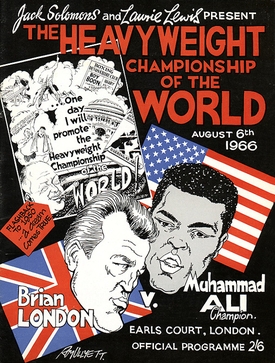
George Edward Foreman is an American former professional boxer, entrepreneur, minister, and author. In boxing, he competed between 1967 and 1997 and was nicknamed "Big George". He is a two-time world heavyweight champion and an Olympic gold medalist. As an entrepreneur, he is known for the George Foreman Grill.
Jimmy Young was an American heavyweight professional boxer. Young was known for his awkward, defensive style and counterpunching. He was one of the top contenders of the 1970s, losing a controversial unanimous decision against Muhammad Ali in 1976 and earning a victory over George Foreman in 1977. Young fought many other significant fighters of his era, including twice outpointing Ron Lyle and losing only by a split decision to then-number one contender Ken Norton in a title eliminator in late 1977. Fellow boxer Bobby Watts was his cousin.
During the 1970s, boxing was characterized by dominating champions and history-making rivalries. The decade had many superstars, who also had fierce rivals. Alexis Argüello, for example, who won the world Featherweight and Jr. Lightweight titles in the '70s, had to overcome Alfredo Escalera twice before the decade was over.
During the 1960s, boxing, like mostly everything else around the world, went through changing times. Notable was the emergence of a young boxer named Cassius Clay, who would, in his own words shock the world, declare himself against war, and change his name to Muhammad Ali.

Karl Mildenberger was a German heavyweight boxer. He was the European Heavyweight Champion from 1964 to 1968, during which he retained the title six times. He unsuccessfully challenged Muhammad Ali for the World Heavyweight title in September 1966.
Jean-Pierre Coopman is a retired Belgian boxer who is best known for his title fight against Muhammad Ali in 1976 in San Juan, Puerto Rico, which Ali won by KO in round 5.

Joe Frazier vs. George Foreman, billed as The Sunshine Showdown, was a professional boxing match in Kingston, Jamaica contested on January 22, 1973, for the WBA, WBC and The Ring heavyweight championships.

George Foreman vs. Joe Frazier II, billed as "Battle of the Gladiators", was a professional boxing match contested on June 15, 1976, for the NABF heavyweight championship.

Muhammad Ali vs. Chuck Wepner was a professional boxing match contested on March 24, 1975, for the undisputed heavyweight championship.

Muhammad Ali vs. Earnie Shavers was a professional boxing match contested on September 29, 1977, for the undisputed heavyweight championship.
Muhammad Ali vs. Karl Mildenberger was a professional boxing match contested on 10 September 1966, for the WBC, NYSAC, and The Ring heavyweight championship.

Muhammad Ali vs. Ron Lyle was a professional boxing match contested on May 16, 1975, for the undisputed heavyweight championship.

Muhammad Ali vs. Joe Bugner was a professional boxing match contested on February 14, 1973.

Muhammad Ali vs. Brian London was a professional boxing match contested on 6 August 1966, for the WBC, NYSAC, and The Ring heavyweight championship. The match took place at Earls Court Arena, London, England on 6 August 1966. It was scheduled for fifteen rounds. The match ended in the third round with Ali defeating London by KO.

Muhammad Ali vs. Bob Foster, billed as The Sound and the Fury, was a professional boxing match contested on November 21, 1972, for the NABF heavyweight championship.
Cassius Clay vs. Alex Miteff was a professional boxing match contested on October 7, 1961. Clay won the fight through a technical knockout when the referee stopped the fight in the sixth round. Miteff and Clay would feature in the 1962 film Requiem for a Heavyweight.

Muhammad Ali was a boxer who mastered the rope-a-dope fighting technique. He is widely regarded by many boxing commentators and historians as the greatest heavyweight boxer of all time. Boxing magazine The Ring named him number one in a 1998 ranking of greatest heavyweights from all eras. In 1999, The Associated Press voted Ali the number one heavyweight of the 20th century.
Anthony Perez was an American boxing referee and judge of Puerto Rican descent. During his career, he refereed many major boxing fights and participated in a number of boxing related documentaries.
The Michael Dokes vs. Mike Weaver or, alternately, Mike Weaver vs. Michael Dokes, boxing fights were a pair of fights that occurred in 1982 and 1983 and were for the World Boxing Association's world Heavyweight title. Both fights were considered controversial due to a separate set of situations. They are both among the most widely spoken about heavyweight boxing contests of the 1980s.

Cassius Clay vs. Henry Cooper was a professional boxing match contested on 18 June 1963.












